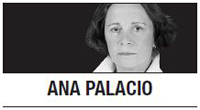 It has been a confusing couple of years for “Davos man” -- the members of the global hyper-elite who gather each year for the World Economic Forum’s flagship conference to mull over the challenges the world faces.
It has been a confusing couple of years for “Davos man” -- the members of the global hyper-elite who gather each year for the World Economic Forum’s flagship conference to mull over the challenges the world faces. After decades of reveling in broad global acceptance of the rules-based liberal world order, the stewards -- and, in many cases, key beneficiaries -- of that order have been forced to defend it from high-profile assaults, most prominently by US President Donald Trump. Rather than fight, however, they seem to be giving in.
Last year, participants in Davos were shaken in anticipation of Trump’s inauguration, which occurred on the final day of the meeting. With the United States about to come under the leadership of a president who loudly touted an “America First” outlook, they looked desperately for a new champion of globalization. As their gaze settled on Chinese President Xi Jinping, the first cracks emerged in their commitment to putting ideas and values above expediency.
This year -- the year of Trump’s Davos debut -- the dam burst. Before the event even began, one could hear rationalizations of Trump’s destructive past behavior, myopic approach to issues like trade, and populist impulses.
That sentiment grew stronger following Trump’s speech at Davos, in which he insisted that “America first does not mean America alone.” After a year in the wilderness, wondering what would become of benign globalism and neoliberal ideas, Davos man had found a new North Star: pragmatism. This is not good news.
To be sure, pragmatism is not, fundamentally, a bad thing. Indeed, Europeans like me are well acquainted with the dangers of inadequately pragmatic policymaking. But a system based exclusively on pragmatism -- where ends justify means and values mean nothing -- can be neither strong nor stable.
As for Trump, it is not even clear that his approach is pragmatic to begin with. Of course, there are those who argue that his bluster on the international stage is the work of a businessman attempting to strengthen his negotiating position, so that he can bring recalcitrant and free-riding members of the international community in line. Trump is, they argue, simply forcing an adjustment toward sovereignty, after a prolonged period of international overreach. They tell us to judge him by his deeds, not his words.
So let’s look at his deeds.
Trump’s rash outbursts have allowed North Korean dictator Kim Jong-un to present himself practically as a peacemaker by comparison.
Trump kowtowed to Israel’s government by recognizing Jerusalem as the country’s capital and pledging to move the US embassy there next year, without getting a single concession in return.
Trump’s record on economic multilateralism is no better. When Trump withdrew from the Trans-Pacific Partnership, he claimed that he could strike better deals with each individual party. Instead, the other parties have moved forward without the US. Now, the US is watching China move to fill the vacuum Trump has left behind in Asia.
Similarly, Trump hastily withdrew from the Paris climate agreement before taking the opportunity to shape its rules, which could have served US interests. At best, this is politics; it is certainly not pragmatism.
He futilely continues to try to revitalize a coal industry. At best, this is politics; it is certainly not pragmatism.
Trump apologists would probably argue that we are looking at the wrong deeds. He did, for example, fulfill his promise to reduce the US corporate tax rate, a move that has added further fuel to the soaring US stock market.
But, even if we regard these developments as evidence of a certain pragmatism, the sudden embrace of Trumpism carries deeper risks. A stable system requires buy-in and belief. Even if the reality never looks like the ideal, the pursuit of that ideal serves as a powerful motivator, linking diverse actors through a shared goal.
By so easily betraying the values that have long underpinned the rules-based liberal world order -- such as multilateralism, democracy, and the rule of law -- the toadies in Davos have put the lie to the entire system. This is not a correction; it is destruction. And it will hurt all of us. After all, while the liberal world order surely is in need of reform, so that it can deliver more of what it has promised, it remains our best hope.
Some leaders recognize this. French President Emmanuel Macron dedicated his own Davos speech to calling for a “true global contract.” But Macron cannot do it alone. All people who believe in building a better world through cooperation and collaboration must raise their voices. I’m looking at you, Davos man.
By Ana Palacio
Ana Palacio, a former Spanish foreign minister and former senior vice president of the World Bank, is a member of the Spanish Council of State and a visiting lecturer at Georgetown University. -- Ed.
(Project Syndicate)
-
Articles by Korea Herald




![[Herald Interview] 'Amid aging population, Korea to invite more young professionals from overseas'](http://res.heraldm.com/phpwas/restmb_idxmake.php?idx=644&simg=/content/image/2024/04/24/20240424050844_0.jpg&u=20240424200058)













![[KH Explains] Korean shipbuilding stocks rally: Real growth or bubble?](http://res.heraldm.com/phpwas/restmb_idxmake.php?idx=652&simg=/content/image/2024/04/25/20240425050656_0.jpg&u=)

